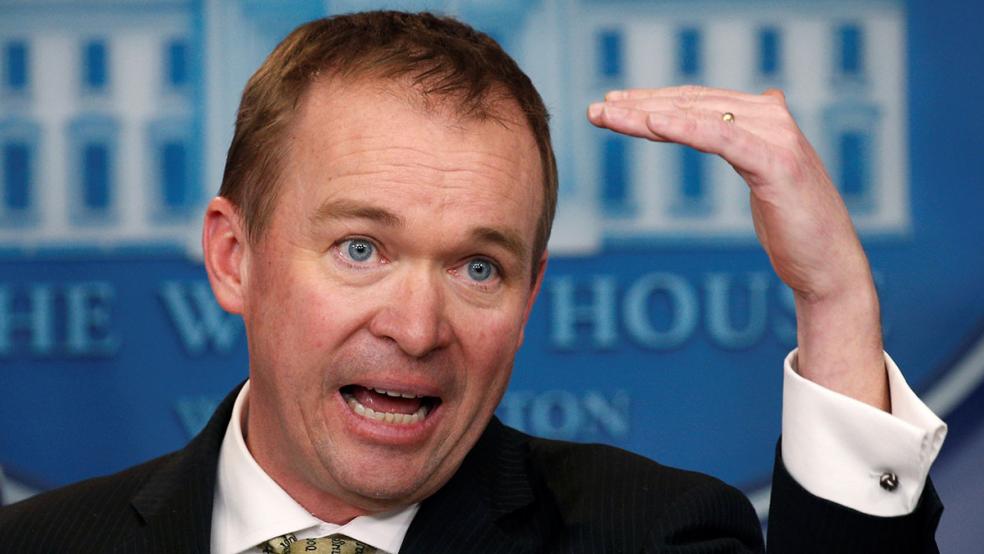The White House press briefing on Thursday afternoon featured a near-meltdown by Press Secretary Sean Spicer as he sparred with reporters over President Trump’s claims about surveillance during the 2016 election. But an appearance at the start of the event by Office of Management and Budget Director Mick Mulvaney was equally stunning in its own way.
Defending the administration’s budget proposal that he been released earlier in the day, Mulvaney made a string of seemingly hard-hearted pronouncements about the rationale for slashing programs that provide funding for things like Meals on Wheels, which delivers food to elderly shut-ins, and after school programs that provide food for hungry children.
Related: The Five Biggest Winners and Losers in Trump’s Fiscal 2018 Budget
The context was a discussion of Community Development Block Grants, which the administration wants to eliminate from the federal budget. Around since the 1970s, CDBGs are used to fund a variety of programs at the discretion of the states receiving them. Reporters at the briefing pointed out that by eliminating them, programs like Meals on Wheels and after-school education programs would lose significant funding.
Mulvaney said that was an acceptable outcome, because programs like Meals on Wheels don’t “show results.”
It was unclear what sort of results Mulvaney meant, particularly with regard to a program that literally relieves hunger, but when he was asked if the cuts seemed a bit harsh, he said that on the contrary they were actually “compassionate.”
“I think it’s one of the most compassionate things we can do,” he said. “You’re only focusing on half the equation. You’re focusing on recipients of the money. We’re focusing on both the recipients of the money and the folks who give us the money in the first place. And I think it’s fairly compassionate to go to them and say look, ‘We’re not going to ask you for your hard-earned money anymore, single mom of two in Detroit. Give us your money.’ We’re not going to do that anymore unless we can guarantee to you that that money is actually being used in a proper function, and I think that’s about as compassionate as you can get.”
Related: Trump’s NIH Budget Cuts Threaten a Serious Setback in Medical Research
Setting aside the fact that a single mother of two in Detroit stands a pretty good chance of having no or even negative federal income tax liability in a given year, Mulvaney’s claim that the program doesn’t show results was also quickly debunked.
Mick Mulvaney says Meals on Wheels "not showing any results." Actual peer-reviewed research says otherwise. https://t.co/B6ZRxtWIAf pic.twitter.com/YI6jiAgMBk — Christopher Ingraham (@_cingraham) March 16, 2017
Then Mulvaney claimed that after school programs, particularly ones that provide food to children at risk of hunger, are also ineffective and undeserving of federal funds.
“They’re supposed to be educational programs, right? That’s what they’re supposed to do. They’re supposed to help kids who don’t get fed at home get fed so they do better in school. Guess what? There’s no demonstrable evidence they’re actually doing that. There’s no demonstrable evidence they’re actually helping results, helping kids do better in school which is what, when we took your money from you, to say, ‘Look, we’re going to go spend it on an after school program,’ the way we justified it was these programs are going to help kids do better in school and get better jobs and we can’t prove that that’s happening.”
The thing is, there actually is evidence that after school programs that provide healthy snacks can help improve students’ academic performance, even if only by reducing the generalized stress on kids suffering in poverty and hunger.
Related: Trump’s ‘Hard Power’ Budget Gives Billions to Defense, Guts Domestic Programs
Mulvaney also threw the Head Start program under the bus, and justified the administration’s plan to eliminate the Corporation for Public Broadcasting by saying that it was unfair for coal miners and single mothers to have to support public television. This despite the fact that one of the major functions of PBS, for example, is creating educational content for young children who may not be getting the stimulation they need at home.
The OMB director also airily dismissed concern about the administration’s decision to eliminate funding for programs meant to study and combat climate change. “We’re not spending money on that anymore. We consider that to be a waste of your money.”
While the Trump budget plan may be bad news for hungry elders and kids, fans of public radio and people who care about the environment, there’s at least one group of people who are likely excited: the actors in the running to play Mulvaney on this week’s episode of Saturday Night Live.





